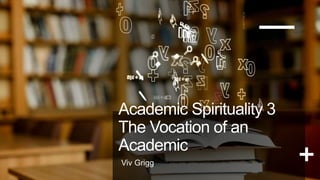Academic Spirituality 3: Vocation to Multiply Thought
- 1. Academic Spirituality 3 The Vocation of an Academic Viv Grigg
- 2. #3 FOCUS: Voice, Vocation, Volume #1 Academic Authority #2 Wisdom Crafted in Monastic Structure Now #3 Voice, Vocation, Volume Previous:
- 3. Genesis of a Voice: Ideas Drive the Universe The VOICE produced the waves of light, sound, structure, coalescing in ever broadening circles and colling into entities some filled with life
- 4. The Wind carries the Voice – it Calls, such is a Vocation, a calling that calls The VOICE produced the waves of light, sound, structure, coalescing in ever broadening circles and colliding into entities some filled with life and leaves and the healing of doves.
- 5. The Voicing of Ideas Becomes Us Vocation is birthed in the incarnation of the ideas in our lives and those of our followers Vocation is birthed in our incarnation within the lives of our followers. e.g. My sister, carer of street orphans, calls me, burned out e.g My brother who has created a retreat for the burned out on an orchard offers to care. The movement of ideas is within the damaged lives of our people. Damaged by the cross as they are sacrificing themselves for others. Healed by the community of those walking their walk. From the movement of such people, the movement of ideas brings the transformation of the nations.
- 6. The Vocation Calls Forth the Character of Culture Voice: Perceive & Research Vocation: Publish & Present Volume: Propagation of New Ideas Through Amplifiers e.g. How does the University amplify a learned professor’s voice? Values Change: Paradigm Shifts into the Streams of Thought within Cultures (4V’s, 4 P’s)
- 7. Vocational Positioning: Support Structures that Empower the Voices 1. The discipline of incarnation within Spirit-driven domains is a category of Biblical spirituality (ours and our students). 2. The splitting of the academy into disciplines provides accountable contexts of the expansion of the Spirit’s work. 3. The primacy of academic reflection must drive our time allocation Research and writing is a historical category of spirituality that spans Christian history. The disseminating of the domains has now moved to the publishing, producing, creating vehicles of movies and internet material. As we mature, the expansion of new paradigms, and working towards our magnum opus is required, not regurgitating a 50-year-old discipline. 4. Four levels of academic structure supports the dissemination process: • At global levels: the leadership consultation and the doctorate • At transitional leadership levels: The academic programs • At emergent levels: The grassroots toolkit • At support structural levels: the organization of recruitingment, student management, and resource management
- 8. Vocational Support Structures: Dynamic Equivalence of the University with Older Monastic Orders? The role of a University is to be an amplifier of Voices, to create the contexts for hearing the Voice and vehicles of dissemination of Voices around people of spiritual authority as Voices. – one measurable outcome is to produce numbers of students, but this is not the overarching goal. – This was accomplished in the Monasteries in the past as they dedicated their time to the copying and transmission of knowledge. – Today the equivalent is accomplished by providing a structure that protects the quietness to faculty from the hustling of resources and aids in the recruiting and managing learners, so they may focus their voices. – While we are activists, we live with a tension to also prioritize reflection and guard ourselves from time commitments to lesser goals than spiritual formation of learners, activist skills training within the discipline and the expansion of ideas.
- 9. Academic Spirituality The Vocation of an Academic Viv Grigg, 2024, www.wciu.edu/matul Vocation: Identify your role within your discipline Voice: Define the new paradigm shifts you have been discovering Volume: What vehicles of Communication are available, have you mastered? Values: How will you/your people transform the culture?

